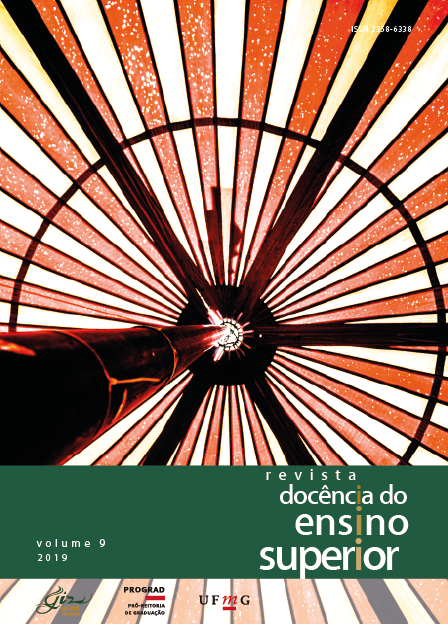Teaching trajectories
completing pathways
DOI:
https://doi.org/10.35699/2237-5864.2019.14678Keywords:
Life history, Professor trajectory, Professor formation, Higher educationAbstract
This article aims to report and ponder about a formative practice held at the Permanent Forum of University Pedagogy on a community university. The main objective of the practice was to provide university professors with moments of understanding the professor's role in their personal and professional life trajectory and how this influences the teaching practice. The used methodology was to work with Life History through the building of a Patchwork. Each participant shared their own experiences each other and that's how the Patchwork was stitched together, connecting stories of different people, who went through different experiences. By analyzing the narratives, we consider that the moments of formation made it possible to bring out life history meanings and how these experiences affect the perspective of the present in their teaching practice, as well as the understanding that both professor and academics are actors of the learning process, as well as individuals endowed with subjectivity.
Downloads
References
ABRAÃO, Maria Helena Menna Barreto. O professor e o ciclo de vida profissional. In: ENRICONE, Délcia. Ser professor. Porto Alegre: EDIPUCRS, 2002.
BRASIL. Ministério de Educação e Cultura. LDB - Lei nº 9394/96, de 20 de dezembro de 1996. Estabelece as diretrizes e bases da Educação Nacional. Brasília: MEC, 1996.
BENEDITO, A. V.; FERRER, V.; FERRERES, V. La formación universitaria a debate. Barcelona: Universitat de Barcelona, 1995.
BOHOSLAVSK, Rodolfo. Orientação vocacional: a estratégia clínica. São Paulo: Martins Fontes, 1980.
FREITAS, Fernanda de Lourdes. A identidade do professor da teoria à prática. Casa do Psicólogo: São Paulo, 2014.
HUBERMAN, Michael. O ciclo de vida pessoal dos professores. In: Nóvoa, Antônio (org.). Vidas de professores. Porto: Porto, 1992.
KUPFER, Maria Cristina. Freud e a educação: o mestre do impossível. São Paulo: Scipione, 1992.
LÜDKE, Menga; ANDRÉ, Marli. Pesquisa em educação: abordagem qualitativa. São Paulo: EPU, 2001.
MARQUES, Mario Osório. Escrever é preciso: o princípio da pesquisa. Ijuí: Ed. Unijuí, 2001.
MORIN, Edgar. O método I: a natureza da natureza. Lisboa: Europa América, 1977.
MORGADO, Maria Aparecida. Transferência, sedução e autoridade na relação pedagógica. Revista Espaço Acadêmico. v. 11, n. 131, p. 25-31, 19 mar. 2012.
NÓVOA, Antonio. Os professores e a história de sua vida. In: NÓVOA, Antônio (org.). Os professores e a profissão. Lisboa: Dom Quixote, 1992.
NÓVOA, Antonio; FINGER, Mattias. O método (auto)biográfico e a formação. Lisboa: MS/DRHS/CFAP, 1988.
PEREIRA, Marcos Villela. Subjetividade e Memória: considerações sobre formação e autoformação. Ijuí: Ed. UNIJUÍ, 2000.
PIMENTA, Selma Garrido; ANASTASIOU, Léa das Graças Camargos. Docência no Ensino Superior. São Paulo: Cortez, 2014.
QUEIROZ, Maria Izaura Pereira de. Relatos orais: do “indizível” ao “dizível”. In: SIMSON, Olga Rodrigues de Moraes Von (org.). Experimentos com histórias de vida: Itália-Brasil. São Pedro: Vértice, 1988.
RECH, Rose Aparecida Colognese. Fotografia 1 - Professores representando suas trajetórias de vida, 2017.
RECH, Rose Aparecida Colognese. Fotografia 2 - A colcha de retalhos exposta na parede da universidade, 2018.
Downloads
Published
How to Cite
Issue
Section
License
Authors who publish in this journal retain the copyright and grant the journal the right of first publication, with the work simultaneously licensed under the Creative Commons Attribution License which allows the sharing of work with acknowledgment of authorship and initial publication in this journal.
Authors are authorized to take additional contracts separately, for non-exclusive distribution of the version of the work published in this journal (e.g. publish in institutional repository or as a book chapter), with acknowledgment of authorship and initial publication in this journal.
Open access policy:
Revista Docência do Ensino Superior is an Open Access journal, which means that all content is available free of charge, at no cost to the user or their institution. Users may read, download, copy, distribute, print, search, or link to the full texts of the articles, or use them for any other legal purpose, without seeking prior permission from the publisher or author, provided they respect the license to use the Creative Commons used by the journal. This definition of open access is in line with the Budapest Open Access Initiative (BOAI).
























